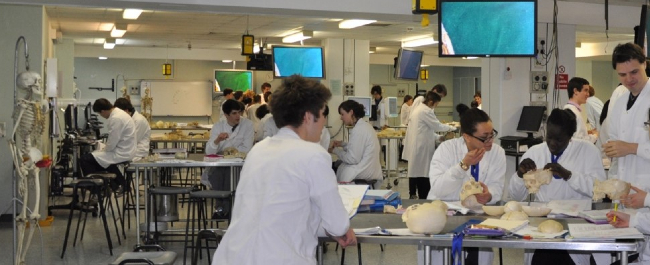Applied Anatomy
What can you expect from the Applied Anatomy course?
First year
In Year 1 our students study Anatomy, Physiology and Neuroscience Units. In Anatomy, the theme of study is "principles of vertebrate design". Students use lectures, practical classes, and online materials such as quizzes and interactive resources to learn the anatomy of humans and animals from a functional perspective.
Our expert lecturers also teach on the veterinary, medical and dental programmes here at Bristol and bring their unique knowledge and perspective to the Applied Anatomy course.
Throughout Year 1, students are guided through a transition from school to university teaching via a series of interactive tasks completed through our personal tutor system.
Second year
Year 2 of the Applied Anatomy BSc offers many exciting opportunities for study. Guided by our passionate and friendly team we aim to enthuse and inspire anatomical curiosity and give students a good firm basis as anatomists, as well as developing skills in self-directed learning, reflection and research.
This will be achieved through our human and veterinary anatomy units where you will explore all body regions in depth for both humans and across a range of animal species - from amphibians to mammals and all that is in between. Here we consider comparative form and function – why does each species look the way that they do?
These units will be complemented with the rare opportunity of undertaking full body dissection with a unique unit that offers comparative dissection of both animal and human material at the same time.
The year will culminate with our unparalleled imaging unit. Here you will gain theoretical and practical skills with hands on experience visualising anatomy through a series of modalities - from ultrasound to CT to virtual reality, in our custom-built imaging suite.
Third year
In the final year you will apply anatomical knowledge from years one and two across two strands – expert-led seminar sessions and your individual research (capstone) project.
Seminars will tackle a broad range of topics by in-class discussion. For example, how do babies differ from textbook anatomy? What differences are seen in athletes? After surgery? In older people? Are considerations different in other mammals? Where does anatomy fit in society?
For many the capstone project is the highlight of the final year - exploring an anatomical topic relevant to your own interests and future ambitions. This can be by empirical research (evidence obtained through observation or scientific data collection methods), assessing material from the literature, or by producing a physical or digital object like a teaching resource.
This makes for an exciting environment of individual and collaborative experiences which will help you to build important transferable skills and develop confidence in researching ideas independently.
